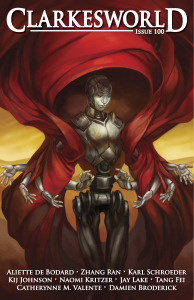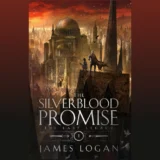While I was reading Tang Fei’s short story, A Universal Elegy, it was like traveling in a train without a concrete destination. It just clanked on and turned where you least expected, yet every moment you would cherish before the journey was over. The story was told in the form of a series of letters, from a sister to a brother, recounting her life with an alien lover in an alien world.
As it is difficult to discuss a short story like this without any spoilers, I will mark out the spoilers where they are.
So the story starts with the first letter from the sister, telling her brother that she was leaving their home planet with an alien man, who looked just like a handsome human male and was every bit a role model for good lover, though not without some minor peculiarities. However, later on, things went a little weird and the truth began to show……
At one point, the protagonist decided to flee the alien world, and the story ends here, but my fascination knows no boundary. The eeriness of the alien race/world and the idealism of the narrator twined into a unique reading experience. In order to prepare this article, I tried to contact the author, Tang Fei, and she answered my not-so-straightforward questions with abundant patience and insights. My understandings of the story are actually embedded in those questions and Tang Fei managed to turn them into a kind of preamble and make her own points.
The questions and answers are originally in Chinese and I made my own translations here.
Shaoyan Hu for Amazing Stories: When the story was first published in the Chinese magazine New Science Fiction, it was under the title The Completeness of Love, while the translated work was called A Universal Elegy. Are there any special reasons for the difference?
Tang Fei: I am actually quite shy about my writings. I rarely show my stories in public, or send them for publication. My husband took this story and sent it to publishers. It somehow found its way to New Science Fiction magazine. But when I saw the sample, the title was The Completeness of Love, which surprised me a little because to me, it gives an impression of Chinese TV dramas produced some thirty years ago. My husband thought that the editors would approve of this title. But it had been A Universal Elegy all along.
ASM: The story is in the form of a series of letters, and the recipient is the brother of the protagonist. However, the recipient barely has any influence on the plots. So, is it reasonable to think that the protagonist was actually talking to her own subconscious? And does this conversation have any effect on the development of the character?
TF: The recipient is actually the twin brother of the protagonist. So it can be interpreted as ‘another me’. As for whether this recipient really existed, or to what extent the contents of the letters could be trusted, no one could guarantee.
ASM: In this story, completeness and perfectness are different things. To achieve perfectness, you have to abandon completeness. The perfect form of completeness exists only in the chant of the spirit collective. Does this represent your own opinion? Do you think it is possible to write a story that can achieve both completeness and perfectness?
TF: You are right to say that there is the contradiction between completeness and perfectness in the story. And there is the contraction between individual and collective, as well. In A Universal Elegy, there were two ways to achieve perfectness, both involving self-sacrifice. However, the protagonist chose neither of them, which might be rather frustrating for the readers. Come to think of it, I suddenly feel the protagonist was a little too “fussy”…
In my stories, I only raise questions but do not provide answers to them. I am really reluctant to offer opinions. It is terrible. What I mean is, to do so is too much a burden to bear. The author of a story is responsible for showing readers more possibilities, encouraging understanding and tolerance for those possibilities. To put it in a nutshell: you have to be interesting.
***START OF SPOILERS***
ASM: On the surface, this is a love story, but I think it carries more meanings than that. For example, the alien race can segregate and discard body parts, preserving what they deem useful and throwing away the harmful. In my point of view, this is a metaphor that implies utilitarianism of the modern society. When you write your stories, would you like to create metaphors on purpose, or do you allow the story to develop its own meanings?
TF: I thank you for understanding my story. It is a touching feeling to be understood. I have passed age of writing mere love stories. If my story unravels around a couple, it is because love happens to be the driving force of that story and I am trying to pry into the thoughts of people in love to explore human feelings. Looking back, at the time (of writing this story), I was not happy with the way a person could be exploited and utilized, or at least I was troubled by the idea. It was far from a perfect world. Imagine in a night bus, if all the passengers around you were amputated body parts, which just had certain “useful” functions, it would be both absurd and terrifying, and sometimes, I had the same feeling in real life.
When I write a story, I will not try to structuralize it for a particular purpose. Instead, I write it as it grows in my mind, and stay true to my heart.
ASM: Furthermore, the aliens sacrifice their body parts to the vine-like creature to get rid of unwanted memories. It might be considered as a kind of self-examination and self-purification. Your works are usually sensitive to the feelings, and focused on the emotions of the characters. So, are there anything similar to self-examination and self-purification in your other stories?
TF: If I have time, I might consider expanding this story into a novel. When the concept of the vines came into my mind, it represented the other end of the spectrum of humanity, the flip side of humans on the Earth. Many of my characters are usually conscious of sin. It may not be the same as guilty. They simply find fault with themselves and nurture an uneasy feeling. I have never experienced drastic changes in my life and I don’t think I am very talented, either. So I have to find some other ways to understand the world, one of which is through understanding people. This story was written a few years ago. My recent works are a bit different.
***END OF SPOILERS***
(Ed. Note: Tang Fei’s story can be found in Clarkesworld Magazine, issue 100, here).












